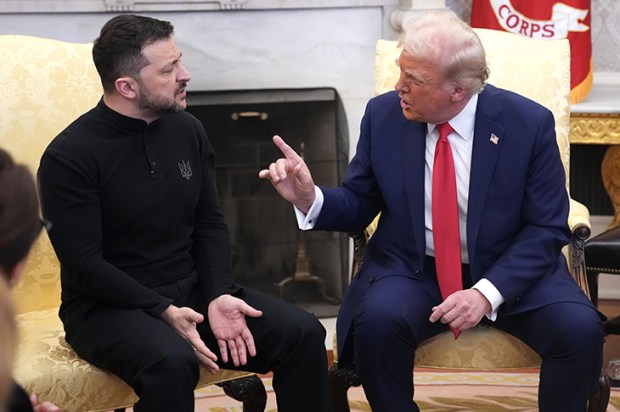Members of the Euro-elite sold as ‘mainstream conservatives’ have a well-deserved reputation for being untrustworthy, with a tendency to cosy up to the left on immigration, wokery and Green issues. British Conservative party leader Kemi Badenoch has said that during her party’s fourteen years in office it ‘talked right and governed left’. On the Continent, examples abound. When Mark Rutte, the long-serving ostensibly centre-right prime minister of the Netherlands until last year, was threatened in the lead-up to the 2017 election by anti-immigration firebrand Geert Wilders, he warned migrants during the campaign to ‘act normal or leave’. Once safely re-elected, his warning was forgotten and the immigration tidal wave and failure to integrate new arrivals continued.
Germany’s Angela Merkel has perhaps been the most spectacular example of the genre. The heir to Christian Democrat (CDU) giants Konrad Adenauer and Helmut Kohl caused catastrophic damage to her country by decreeing the closure of its nuclear power plants. She then turbo-charged Europe’s anti-immigration right by throwing open the Continent’s borders to the Third World.
Will Germany’s next Chancellor, Friedrich Merz, the latest Christian Democrat leader, be yet another fraud? He carries the hopes of Germans who, at the 23 February elections, followed Europe’s now well-established trend of recent years in punishing the left and voting for the right. The senior party in the previous government, Olaf Scholz’s Social Democrats (SDP), received the worst result in its history, 16 per cent, 9 per cent down on the previous 2021 elections. Their main partner, the Greens, were similarly humiliated. By contrast, the strongly anti-immigration Alternative for Germany (AfD) won a record 21 per cent, double their vote in 2021. With 28 per cent, Merz’s Christian Democrats’ came first – even though this was the second-worst result in their history.
The reasons for voters’ rejection of Scholz’s government aren’t hard to fathom. Germany, Europe’s former powerhouse, has been in recession for the last two years. Energy prices are two to three times higher than in the US. The historical pride of its economy, the motor industry, is in crisis as consumers fail to warm to electric cars. Production and exports have slumped, and plants have closed. Unemployment recently reached 6.4 per cent, the highest in ten years. And meanwhile Germans are deeply unhappy about the mass immigration unleashed by Merkel, and its attendant terrorism, crime and social security burden.
President Trump is optimistic that Germany will now change for the better. Days after Vice President Vance attacked Germany’s out-of-control immigration and restrictions on freedom of speech, Trump congratulated Merz, saying the people of Germany had ‘got tired of the no commonsense agenda, especially on energy and immigration’. His ‘very big’ win was ‘a great day’ for Germany and for the United States.
Merz is well to the right of Merkel and has fiercely criticised her immigration record. His party’s radical manifesto commits to a Trumpian brew of tough border security, offshore processing and deportations. It also opens the way to reopening existing nuclear power plants and establishing new ones.
On climate issues, Merz says ‘Green policies have gone too far’ and that he’ll give priority to driving economic growth. That includes reversing the EU’s 2035 ban on new petrol and diesel cars, a move many other member-states may well support. (Merz at the same time doesn’t challenge his predecessors’ piety of reaching net zero by 2045, saying that carbon taxes are the way to achieve that.)
If Merz’s CDU had won a majority of parliamentary seats, Trump’s optimism would probably be justified. But the only other party whose numbers would give him a majority and which supports his policies is the AfD – which he’s ruled out going into coalition with, because Germany’s establishment considers it extremist. The policy means Merz has no option but to go into government with the rejected, failed left, the Social Democrats. They will almost certainly resist key parts of his programme, a slap in the face to voters, most of whom wanted a government of the right.
The political establishment’s rejection of working with the AfD is absurd. Germany of course carries heavy historical baggage, so the occasional party representative whitewashing the Nazi past rightly attracts attention and condemnation. But the AfD leadership is clearly committed to democracy and an unequivocal condemnation of the Nazi past and is little different to many other conservative European political parties focused on stopping mass immigration now in government across the continent. The idea that the AfD’s candidate for chancellor Alice Weidel, who is a fluent English- and Chinese-speaker with a background in international finance and in a gay relationship with a Sri Lankan-born film producer, might be a secret Nazi is ridiculous. In Europe these days the only people Jews need to worry about are the Islamists and their leftist allies – which is why they feel safe in Budapest, Prague and Warsaw, which strangely haven’t been tempted to emulate the radical multicultural experiments of London, Paris and Berlin.
Despite a likely formal coalition with the Social Democrats, Merz might accept AfD votes on key measures the left oppose, as he’s done previously. If he doesn’t deliver the vital changes Germany needs, the AfD will strengthen further and could win at the next elections in 2029.
While pro-American, Merz hasn’t followed Emmanuel Macron and Keir Starmer in trying to establish good relations with Donald Trump. He responded to the President’s warm congratulatory message by wondering if Nato would survive and saying his priority was to strengthen an independent European defence capability. Paradoxically, it’s Donald Trump’s insistence that security guarantees to Ukraine must be Europe’s responsibility that is finally kicking along this long-held dream of the anti-Nato Euro-federalists.
Merz’s resentment of Team Trump’s support for the AfD, anger at Washington’s threatened 25-per-cent tariffs on EU imports and strong solidarity with Ukraine mean Berlin’s relations with the White House are at a low ebb. Merz will surely try to repair them. And just as Starmer has milked the returned president’s fascination with the royal family and love of his mother’s Scotland, Trump’s Rhineland German ancestry on his father’s side and self-description as a ‘proud German-American’ presents an opportunity for Merz, should he choose to seize it.
Got something to add? Join the discussion and comment below.
@markhiggie1
You might disagree with half of it, but you’ll enjoy reading all of it. Try your first month for free, then just $2 a week for the remainder of your first year.













